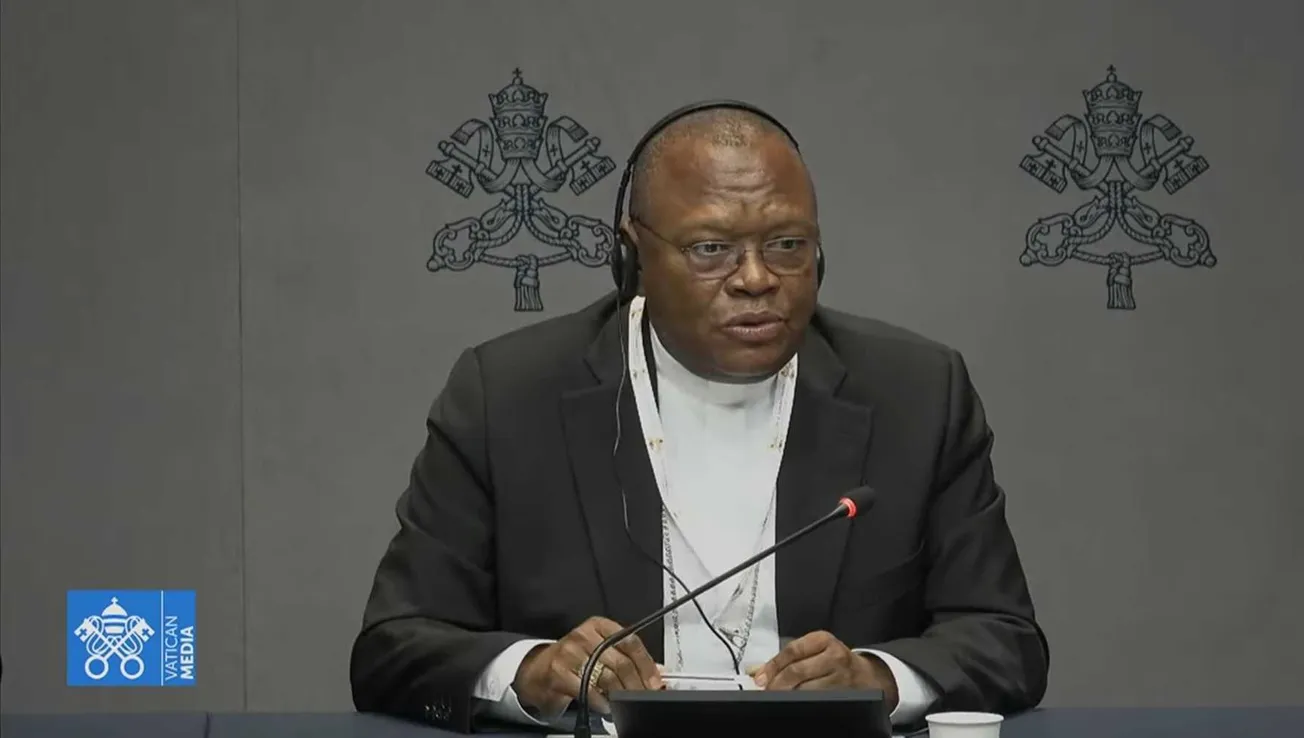VATICAN CITY — Africa’s top bishop says Pope Francis’ plan to seek sainthood for King Baudouin of Belgium will have to face the “black mark” of his alleged involvement with an assassination plot in the Congo.
Cardinal Fridolin Ambongo Besungu, a Capuchin Franciscan who serves as Archbishop of Kinshasa, spoke to reporters at a press briefing Tuesday during the Synod on Synodality. In response to a question from Black Catholic Messenger, he implied that the murder of his country’s first prime minister, Patrice Lumumba of the Democratic Republic of the Congo (DRC), is indeed tied to the late European royal.
Belgian and Congolese laity alike have protested the Holy Father’s announcement of a Baudouin sainthood cause, which is still in its nascent stages and has yet to take concrete form. Asked for his thoughts on the matter, Ambongo noted public support for and criticism of Baudouin.
“Naturally, since the Pope expressed the wish of the Church of Belgium, there has been this reaction,” he said, speaking in French.
“But I think that this is what the study of the cause of beatification and the cause of canonization is about. We will dig into the past to see what is there.”
Today in Rome, Cardinal Fridolin Ambongo Besungu of Kinshasa said there is a "sort of stain" on the legacy of King Baudouin of Belgium, for whom Pope Francis has said he will seek sainthood.
— Nate Tinner-Williams (@natemup) October 22, 2024
The late ruler once publicly praised his uncle Leopold II's bloody Congo Free State. pic.twitter.com/tF1kmFKByB
Ambongo himself grew up in the immediate aftermath of Lumumba’s 1961 assassination at the hands of Belgian-commanded soldiers. As a bishop, he has been an outspoken voice for peace and justice in the often war-torn DRC, and has criticized unchecked resource extraction from its mineral-rich lands.
Even so, he said an investigation of Baudouin in view of sainthood could reveal a figure “courageous in the context of Belgium”—apparently as opposed to his actions elsewhere.
The king has been lauded by Francis and others for his devout faith and efforts to oppose abortion in his home country, but he remains highly controversial in Africa.
At a ceremony granting independence to the Belgian Congo in 1960, Baudouin praised his infamous great-granduncle King Leopold II as a “genius”—despite his genocidal actions as head of the Congo Free State, which led to the deaths of up to 10 million inhabitants in what is known as the “Rubber Terror.”
Lumumba responded to Baudouin with a speech of his own, excoriating the Belgian regime for its colonial atrocities. Baudouin maintained hostilities against Lumumba thereafter, supporting secessionist forces during the Congo Crisis. At best, he later ignored a deadly plot against Lumumba, whose murder led to the brutal three-decade dictatorship of Mobutu Sese Seko and successive civil wars.
The dueling speeches took place in what was then known as Léopoldville, renamed in 1966 to Kinshasa, the seat of Cardinal Ambongo’s diocese. In his comments this week, the prelate did not speak at length on Baudouin’s ills, instead emphasizing that the sainthood process is essentially wait-and-see.
“We do not know the twists and turns of his life,” he said, apparently referring to possible impediments.
Neither Pope Francis nor the Vatican has shared details on the Baudouin cause, which was announced abruptly by the Holy Father during his visit to Belgium in September. An official canonization push normally originates in the home diocese of the deceased, but Archbishop Luc Terlinden of Brussels—a young prelate appointed only last year—does not appear to have commented publicly on the matter.
As for the Congolese bishops, Ambongo—the president of the Symposium of Episcopal Conferences of Africa and a member of Francis’ Council of Cardinals—says they are not intimately involved with the process but are also not prematurely opposed.
“If the case evolves in the direction that some want to present him for canonization, we are open,” he said, though quickly reiterating that the Lumumba affair cannot be forgotten.
“There is still this matter that we can call a black mark. So we follow like everyone else.”
Nate Tinner-Williams is co-founder and editor of Black Catholic Messenger.










